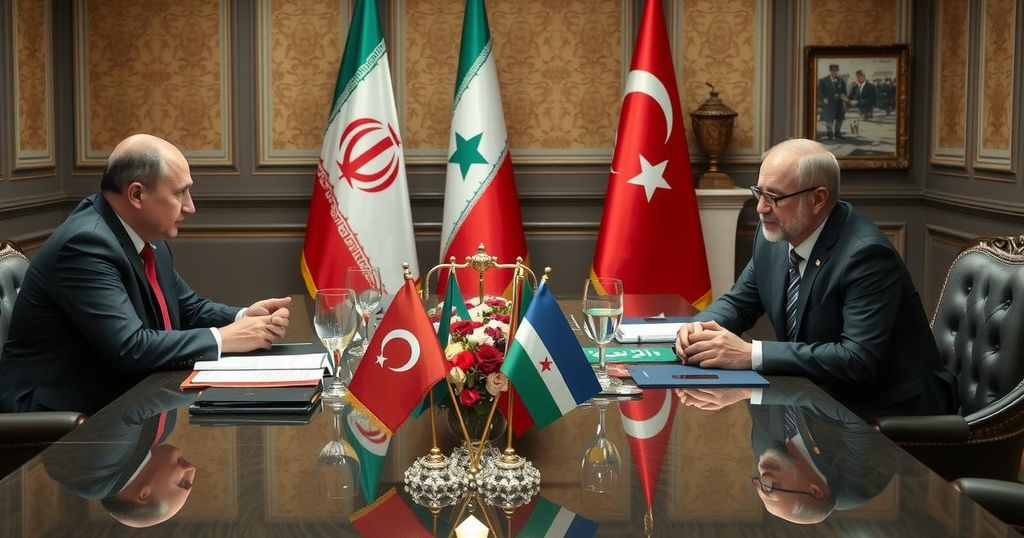Russia, Iran, Turkey Meet to Address Shifts in Syrian Conflict Dynamics

Turkey, Russia, and Iran are set to meet this weekend in Qatar to respond to a recent rebel offensive in Syria that has altered the conflict’s front lines. The discussions will occur during the Doha Forum, focusing on potential political solutions amid shifting territorial control, primarily after HTS captured significant cities. The talks will also address regional security concerns, particularly regarding Kurdish forces and U.S. involvement in Syria.
This weekend, Turkey, Russia, and Iran are set to convene in Qatar to address the implications of a recent rebel offensive in Syria that has shifted the long-standing dynamics of the civil conflict. The discussions will occur during the Doha Forum, a prestigious event that brings together global leaders and experts to deliberate on various pressing issues.
A source from Turkey’s Foreign Ministry disclosed that Foreign Minister Hakan Fidan will engage in discussions with his Russian and Iranian counterparts as part of the Astana process, which was initiated by these three nations in 2017 to find a political resolution to the ongoing conflict. The backdrop includes a significant milestone in the conflict; Islamist rebels, specifically the Hayat Tahrir al-Sham (HTS), have recently captured the crucial city of Aleppo, along with advances towards Hama and Homs, disrupting the balance of power in the area.
Despite a ceasefire arrangement brokered by Turkey and Russia in 2020 that had stabilized the situation to a considerable degree, the recent offensive challenges this peace. Reports indicate that Russian President Vladimir Putin and Turkish President Recep Tayyip Erdogan have exchanged views on the situation, with Putin emphasizing the necessity to curb hostilities against the Syrian government led by President Bashar al-Assad. Erdogan reaffirmed Turkey’s support for Syria’s territorial unity while stressing the need for Assad’s government to pursue political avenues for resolution.
Turkey remains concerned about the potential establishment of a Kurdish autonomous region in northern Syria, closely associated with the PKK, which Turkey designates as a terrorist organization. The clashes that erupted following HTS’s advances indicate a precarious situation where Turkish-backed forces confront U.S.-supported Kurdish factions.
Simultaneously, the international community continues to monitor the situation, recognizing that neither Russia nor Iran seems ready to negotiate a shift in the governmental structure in Syria. Observers have noted the strategic imperatives that compel both nations to maintain influence in the region, even amidst their distractions and vulnerabilities stemming from external pressures.
Amid the chaos, U.S. forces are also addressing various developments, as recent skirmishes in northeastern Syria highlight the ongoing conflict against the remnants of ISIS. The United States has emphasized the importance of ensuring that ISIS does not regain strength, coinciding with its support for the Syrian Democratic Forces.
In conclusion, the upcoming trilateral talks are crucial in navigating a rapidly evolving situation in Syria, marked by recent territorial changes and the implications of internal and external pressures on the involved nations. Stakeholders continue to emphasize the need for diplomatic engagement and alleviate potential humanitarian crises resulting from these developments, particularly with the specter of refugee flows haunting the regional stability.
The Syrian civil war, entering its 13th year, has created a complex geopolitical landscape involving multiple nations with diverging interests. Turkey, Russia, and Iran initially collaborated through the Astana process in 2017 to seek a political solution and stabilize the conflict. Despite achieving relative calm through various ceasefires, the recent advances by Islamist groups like HTS signify a turning point that could alter the course of diplomacy in the region. As a major player, Turkey’s concerns regarding Kurdish autonomy and its implications for national security remain pivotal. Meanwhile, Russia and Iran are navigating their strategic interests in a tumultuous environment, further exacerbated by their commitments in Ukraine and conflicts in Iraq and Lebanon.
The anticipated talks among Turkey, Russia, and Iran in Qatar reflect the evolving dynamics of the Syrian conflict, underscored by recent territorial shifts brought on by HTS. The need for a diplomatic resolution remains urgent, given the potential for increased violence and humanitarian crises. Each nation’s strategic interests will play a critical role in shaping outcomes in Syria and beyond. Ultimately, the decisions made during these discussions could significantly influence the trajectory of the war and long-standing diplomatic relations in the region.
Original Source: www.voanews.com








